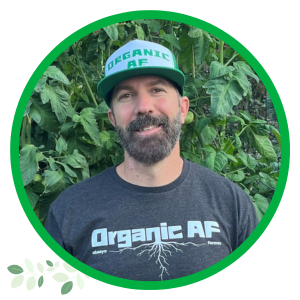Hi Mike! It’s Gwendolyn Wyard here with SOS. Thanks for meeting up with me to answer a few questions about the past, present, and future of organic agriculture. I see you brought a friend with you as well! Hey there little round organic friend?! Well, let’s jump in with some introductions.
Q: Mike, tell me a bit about your work at Organically Grown Company (OGC) and what gets you most excited when you start your day. What makes for a perfect workday? What are some of your career goals, and how does this little round USDA organic friend you brought along fit into the picture?
 A: I am so fortunate to work for a company that is as mission-aligned and purpose-centric as Organically Grown Company is. As a wholesaler and distributor, we are doing the level of work that you usually only see with larger, customer-facing brands; it’s truly amazing.
A: I am so fortunate to work for a company that is as mission-aligned and purpose-centric as Organically Grown Company is. As a wholesaler and distributor, we are doing the level of work that you usually only see with larger, customer-facing brands; it’s truly amazing.
My job is dreamy! As the Director of Advocacy and Sustainability, everything I do is focused on advancing our mission: to promote and inspire the growth of the organic agriculture movement. On any given day, I spend part of my time advocating for organic alongside wonderful organizations like the Oregon Organic Coalition, Washington’s Coalition for Organic and Regenerative Agriculture, Organic Farming Research Foundation, Organic Produce Wholesalers Coalition, Organic Trade Association, The Organic Center and more, through Board service, task forces, committee work, and events. When I’m not engaging with our external partners, I’m developing strategies and working across departments and committees at OGC to reduce our environmental impact through waste diversion, emissions reductions, alternative packaging, and education initiatives.
My career goals are all centered around a purpose – protecting and preserving our natural resources, respecting our planet, and advocating for responsible agriculture and those who are producing our food the right way. I am devoting my career to organic agriculture because I think it is the right thing to do, for our people and for the planet.
Q: Here at SOS, we’re focused on strengthening organic systems with a focus on organic fraud prevention and supply chain integrity. Mike, I know you were involved in the OTA Task Force that convened in 2017 and not only helped to develop an Organic Fraud Prevention Guide for businesses but greatly influenced several of the regulatory updates that were brought about via the Strengthening Organic Enforcement (SOE) Rule that was fully implemented in March 2024. Here we are, seven years later (from 2017). What are your thoughts about NOP enforcement, organic certification, and fraud prevention? What did we get right? Did the rule go far enough? What can you tell me about OGC’s implementation process? What do you think the number one thing is that organic businesses can be doing right now to prevent organic fraud? What do you think SOS should be doing? How do we best fight fraud like a boss??
A: First, congratulations to you, Kim, and Johanna for starting SOS. You are providing a great service as there is so much need right now in the supply chain around fraud prevention and SOE compliance.
In terms of fraud prevention, I feel like we are on the right path with SOE. It was a major step in the right direction, and we should be celebrating it. I love listening to Jenny Tucker talk about how six months in SOE is already improving their oversight of supply chains and enforcement abilities. It’s proof that SOE is starting to have the impact we were hoping it would.
With that being said, I think we need to focus now on building out risk-based controls personalized for individual businesses and supply chains. I was very pleased to see the SOE requirements for fraud prevention plans, but my assumption is that many businesses have a steep learning curve and it will take time and resources to develop a meaningful fraud mitigation strategy tailored to their unique supply chain risks. This is why I think it’s so important to have knowledgeable folks like you that know the regulatory landscape, are trained in fraud prevention plans, and are passionate about the integrity of organic.
Here at OGC, our experience with SOE implementation was pretty smooth. As you noted, we’ve been involved in the discussion for a long time and built our compliance monitoring program decades ago to be able to detect fraud and to be as transparent and verifiable as possible. Over the years, our supply chain partners grew very accustomed to us taking additional steps to verifying the organic status of the produce we purchased. In the months leading up to the SOE implementation date, we did need to work with a handful of logistics partners to help them get certified, but thankfully, most our suppliers and partners were already there..
You asked what else I think SOS should be doing – I’d say your knowledge of supply chain transparency and traceability is perfect for helping businesses comply with the FDA’s new Food Safety Modernization Act (FSMA) Additional Traceability Requirements for Certain Foods Rule. Many businesses feel they are exempt from this rule but don’t understand that many major retailers and buyers are already requiring compliance beyond what the FDA exempts. Everyone should be tracking this rule and doing what they can to comply, regardless of whether they feel they are exempt, simply because of how relevant traceability is to fraud prevention.
Q: One of the services SOS provides is organic regulatory monitoring and readiness. This includes monitoring and engagement with the National Organic Standards Board (NOSB) process, topics, and rule changes. Given our Pacific Northwest roots, I think it’s safe to say we are both excited about the Fall 2024 NOSB meeting that is going to be held in Portland, OR. NOSB is clearly one of your policy focus areas. What do you like the most about the NOSB process, and what topics and/or materials are you especially interested in for the upcoming meeting? Is there anything you would like to see NOSB work on instead and/or prioritize?
A: The NOSB process is remarkable. I can’t think of another ongoing public process that is as transparent and engaging as the NOSB. The ability for the public to have such an influence on responding to issues and developing systems and standards to proactively protect what the organic label stands for is truly amazing. I’ve been following the work of the NOSB for nearly two decades, and the folks I work closely with, including you, have been engaged for even longer.
The organic industry has seen meaningful improvements, such as SOE, due to the work of the NOSB. That said, I would like to see a little more attention from the Board and organic community around research priorities and organic handling practices. There is a lot of activity that occurs between crop and livestock production and processing, what we like to call auxiliary handling, and there are plenty of opportunities during this stage of production for organic products to become compromised – packing, transportation, storage, labeling, conditioning, work-in-progress, sanitation, facility pest control, testing, worker behavior, recordkeeping, purchasing, selling, distribution, etc. In my opinion, the current standards just don’t cover this sector of the supply chain well enough. I don’t think we need overly prescriptive standards, but strengthening post-harvest handling standards would benefit everyone in the supply chain, including certifiers and inspectors.
Q: What is your take on regenerative organic and how it will sit with or apart from USDA organic?
A: This whole discussion around regenerative agriculture is interesting, and I really feel it is damaging organic, primarily because it is fueling confusion and greenwashing. Shoppers are already experiencing ‘label fatigue’ from all the natural green seals on product labels. Meanwhile, some brands are exploiting these undefined (relative to agriculture) terms to gain market differentiation.
There are two things I’d like to see happen related to regenerative – 1) that the dust will settle on defining practices and outcomes, and we end up at a place where the regenerative label is simply organic certification with the addition of fair trade and fair labor standards, backed by third-party certification, like Regenerative Organic Certified (ROC); and 2) that those who say organic standards don’t go far enough come to realize that organic standards provide the minimum you must do to be organic and that most organic producers go above and beyond what the standards require. So, for those who say regenerative is ‘Beyond Organic’ please understand that going ‘beyond organic’ is still just organic…there is no ‘ceiling’ when it comes to organic farming practices and standards.
Q: Going back to our little round organic friend, tell me a bit more about AF and your vision for the future of organic
 A: Well, I gotta say, that as an organic advocate, the work isn’t ‘all fun all the time.’ Shocker, right? Advocacy and policy work is hard and repetitive, comes with setbacks and losses, and requires a ‘long-game’ mentality. This is why, in my free time, I’m pushing the Organic AF campaign, you know, AF as in, Always & Forever (credit to a friend of mine for sharing that slogan with me). My thought is that advocacy shouldn’t always be a battle; it should also be enjoyable. Advocacy doesn’t have to only be writing countless pages of text. That’s why I created Organic AF swag and the little organic mascot, a happy-go-lucky character that will always and forever be celebrating organic agriculture and promoting its benefits. I’ve often heard folks in the organic community say that we need a mascot, similar to how the climate-change movement uses the polar bear, so I took it upon myself to do something…but I put a positive spin on it. My organic friend, who we will call Rubi for now, short for Rubisco (if you know, you know), will hopefully be an inspiring mascot, one that puts a smile on your face and gets the organic message across in an uplifting way. You’ll be seeing Rubi popping up more and more. As for all the Organic AF hats, bags, and shirts, they have become the best conversation starter and a fun way to talk about the benefits of organic…as well as a fun side business. I wear an Organic AF hat or shirt everywhere I go, and people notice!
A: Well, I gotta say, that as an organic advocate, the work isn’t ‘all fun all the time.’ Shocker, right? Advocacy and policy work is hard and repetitive, comes with setbacks and losses, and requires a ‘long-game’ mentality. This is why, in my free time, I’m pushing the Organic AF campaign, you know, AF as in, Always & Forever (credit to a friend of mine for sharing that slogan with me). My thought is that advocacy shouldn’t always be a battle; it should also be enjoyable. Advocacy doesn’t have to only be writing countless pages of text. That’s why I created Organic AF swag and the little organic mascot, a happy-go-lucky character that will always and forever be celebrating organic agriculture and promoting its benefits. I’ve often heard folks in the organic community say that we need a mascot, similar to how the climate-change movement uses the polar bear, so I took it upon myself to do something…but I put a positive spin on it. My organic friend, who we will call Rubi for now, short for Rubisco (if you know, you know), will hopefully be an inspiring mascot, one that puts a smile on your face and gets the organic message across in an uplifting way. You’ll be seeing Rubi popping up more and more. As for all the Organic AF hats, bags, and shirts, they have become the best conversation starter and a fun way to talk about the benefits of organic…as well as a fun side business. I wear an Organic AF hat or shirt everywhere I go, and people notice!
Q: Finally, this is an open-ended question, really a chance for you and your little round organic friend to share anything else you feel should get noticed or be on the minds and/or agenda of an organic business or advocate.
A: That’s simple; what should be on people’s minds is that organic is the answer. It truly is. Organic agriculture and food production offers everything a purpose-driven business, conscious eater, or anyone who gives a damn could ask for. For those who don’t care about the health of farmers and farmworkers, plants and animals, or the fate of our planet, organic may not be the right choice, but for everyone else, it is. Organic can feed the planet despite what many people say. I firmly believe that even without solving our food waste problem, where more than one-third of the food we produce goes uneaten, organic can meet the need – and just imagine how easily we could do it if we put a dent in the food waste issue.
It’s time to quit the fight between organic and conventional and realize that we don’t need to pick sides anymore. Policymakers, the Conventional Ag Lobby and land grant universities need to understand that farmers can and do manage both organic and conventional operations. I’ve done some of my own research and have found that more than 30% of organic crop farmers, 40% of organic livestock farmers, and well over 95% of certified organic manufacturers and processors have conventional production or products as well. We are already co-existing, yet not everyoneunderstands that supporting organic farming and infrastructure through research, funding, and policy benefits conventional farmers as well. Once they can accept that notion, we will gain wider acceptance (and focus) on organic agriculture.
Lastly, I know I’m preaching to the choir, but please use your dollars to support what you believe in. If you want to reward farmers for producing food responsibly, for respecting and protecting our planet, for preserving our soils and resources for future generations, then use organic ingredients in the foods you produce. Eat organic food at home. Teach your friends and families about the many benefits organic offers. Do it for the right reasons and always BE AUTHENTIC!! Be Organic AF, Always & Forever!! [Mic drop]

